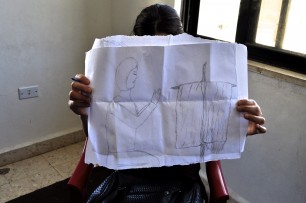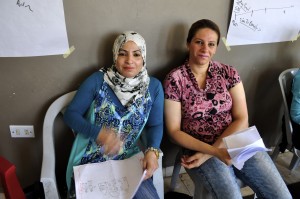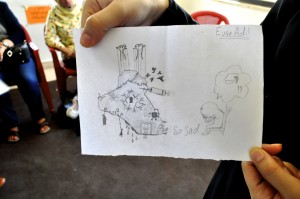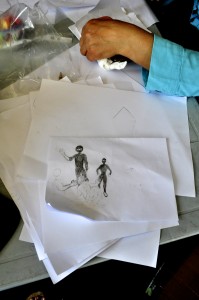
Last week, the Hope Workshop met for a second time to get going on the advocacy quilting project. I admit that before coming here, I was skeptical about the concept, as well as my ability to carry out the project. I don’t have an artistic bone in my body, and I’ve never embroidered before. What authority did I have to implement this?
Luckily, my role in the entire endeavor is minimal. And I like it that way. As we met for a second time, I could see that some of the women were fantastic artists as they proudly displayed their sketches for me.
It’s the stories behind the sketches that give the Hope Workshop heart and soul. As I traveled around the room speaking with the women, they explained their drawings to me in great detail, some tied to memories more painful than others.
Rabab and Nasreen were the first ones to arrive at the meeting and jumped right into conversation about their designs. Rabab, from Iraq, drew a picture of her two children, walking away from a stack of books. “In Iraq, my children went to school,” she said. “Here, they do not.” Nasreen shared the story behind her picture, which depicts militiamen entering a parking lot. The parking lot, she explained, was her family’s used car business. The militiamen seized all the cars before she and her family fled to Jordan.
Jenan explained each and every detail of her drawing to the group. The design shows Iraq, pieces breaking apart, parts stitched together, trees shedding tears, rockets and bombs coming from all sides. Alongside this design, her simpler image of the person sitting in the chair, speaks volumes. “It’s me,” she relayed. “Thinking about the education and opportunity I had to leave behind when I came here.”
Manal did not have to elaborate on her image. The picture of three dark men surrounding a woman demonstrates the pain and violence that often accompanies conflict. One woman brought a picture of an angel. Her wings, she said, represented freedom. However the angel’s hands were shackled. When I asked her about this, she said it represents the freedom she feels here, safe in Jordan, but that the shackles represent the fact that she didn’t experience that same sense of freedom in Iraq.
Another woman drew a picture of herself remembering her work in Iraq. She was a judge, she explained, and missed her robes, which she had to leave behind. She included in the picture the scales of judgment with a large X across them. “There is no justice anymore in Iraq,” she explained succinctly.
Hearing the stories behind the drawings was a humbling experience. I was amazed at the creativity of the women. Many asked me if I liked their drawings, if I thought they were good, and I was unsure of how to answer. Yes, they are incredible artists, but my heart was heavy seeing their struggles and hardship depicted so starkly, pencil on paper.
We will meet again this week to continue with the next phase of the project. As the women of the Workshop are far more qualified than I with all things embroidery, the talented artists of the group will help those still perfecting their drawings with finishing touches. Other women, some of whom have years of experience with embroidery, will give the first-timers a tutorial on the stitching. I’m lucky to be surrounded by such talented women, and excited to see them lead the next session as we continue with the project, but also with our conversations and common sense of purpose.
With love from Amman,
Ally
Posted By Allyson Hawkins (Jordan)
Posted Jul 18th, 2016





8 Comments
Rachael Hughen
July 19, 2016
Some of those drawings are haunting, but I’m sure it must be very therapeutic for them to put their feelings into art like that. Love the sense of community this is creating and how everyone is helping out and taking advice based on their own skill sets.
Allegra Brandon
July 21, 2016
It sounds like this project is making great progress. The women’s stories are heartbreaking, and I hope that embroidering serves as a therapeutic outlet and a good opportunity for a social gathering filled with support, friendship, and love. Great update- I hope to hear more!